Employability Skills Module: Journal Entries and Self-Reflection
VerifiedAdded on 2021/04/24
|8
|1397
|34
Homework Assignment
AI Summary
This assignment comprises three journal entries focused on employability skills, reflecting on self-awareness and career development. The first entry, 'Know Yourself,' utilizes the Gallup strength theory to identify the student's top five strengths: Includer, Connectedness, Restorative, Communication, and Achiever, highlighting their application in professional settings. The second entry, 'Know Your Sector,' contrasts the Gallup theory with the Johari theory, emphasizing the importance of understanding both individual strengths and weaknesses for team collaboration and performance enhancement. The final entry, 'Let Them Know You,' integrates both theories to outline how the identified strengths and understanding of team dynamics can be leveraged to enhance the student's career prospects, particularly in interviews and workplace challenges. The student references relevant literature to support their analysis and reflections.
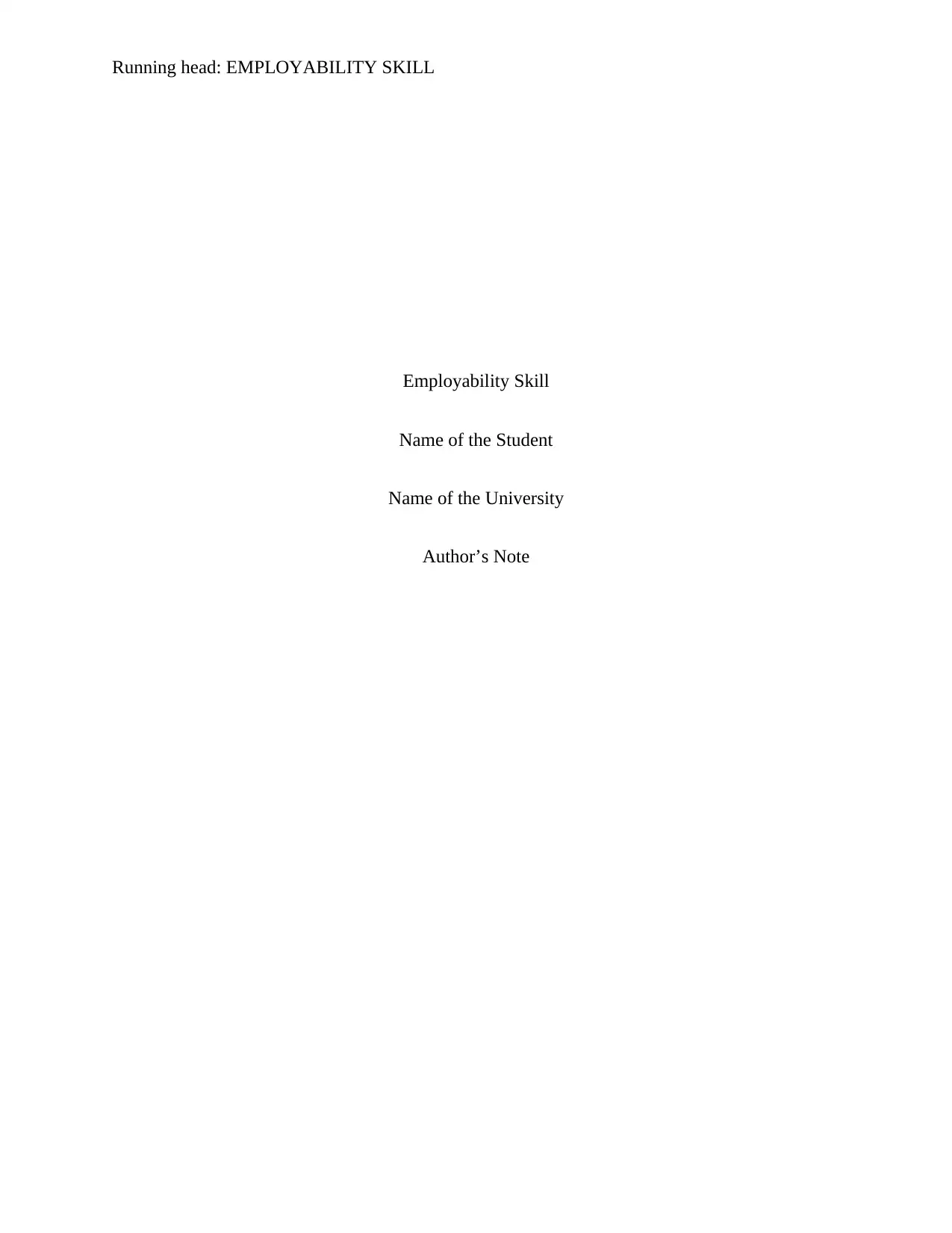
Running head: EMPLOYABILITY SKILL
Employability Skill
Name of the Student
Name of the University
Author’s Note
Employability Skill
Name of the Student
Name of the University
Author’s Note
Paraphrase This Document
Need a fresh take? Get an instant paraphrase of this document with our AI Paraphraser

1
EMPLOYABILITY SKILL
Table of Contents
1.0 Journal entry: 1 ‘Know yourself’...............................................................................................2
2.0 Journal entry 2: ‘Know your sector’..........................................................................................3
3.0 Journal entry 3: ‘Let them know you’.......................................................................................4
Reference List:.................................................................................................................................6
EMPLOYABILITY SKILL
Table of Contents
1.0 Journal entry: 1 ‘Know yourself’...............................................................................................2
2.0 Journal entry 2: ‘Know your sector’..........................................................................................3
3.0 Journal entry 3: ‘Let them know you’.......................................................................................4
Reference List:.................................................................................................................................6
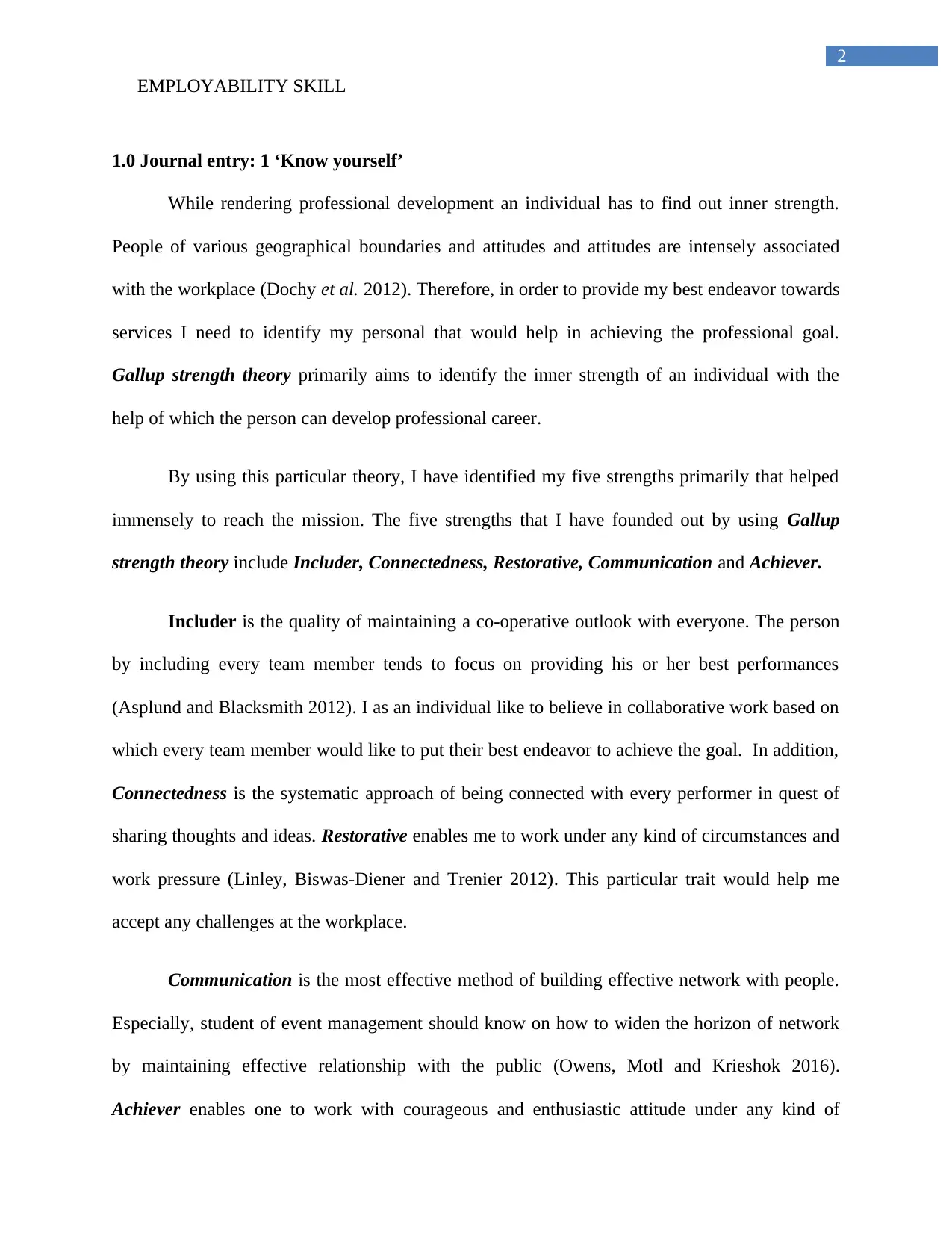
2
EMPLOYABILITY SKILL
1.0 Journal entry: 1 ‘Know yourself’
While rendering professional development an individual has to find out inner strength.
People of various geographical boundaries and attitudes and attitudes are intensely associated
with the workplace (Dochy et al. 2012). Therefore, in order to provide my best endeavor towards
services I need to identify my personal that would help in achieving the professional goal.
Gallup strength theory primarily aims to identify the inner strength of an individual with the
help of which the person can develop professional career.
By using this particular theory, I have identified my five strengths primarily that helped
immensely to reach the mission. The five strengths that I have founded out by using Gallup
strength theory include Includer, Connectedness, Restorative, Communication and Achiever.
Includer is the quality of maintaining a co-operative outlook with everyone. The person
by including every team member tends to focus on providing his or her best performances
(Asplund and Blacksmith 2012). I as an individual like to believe in collaborative work based on
which every team member would like to put their best endeavor to achieve the goal. In addition,
Connectedness is the systematic approach of being connected with every performer in quest of
sharing thoughts and ideas. Restorative enables me to work under any kind of circumstances and
work pressure (Linley, Biswas-Diener and Trenier 2012). This particular trait would help me
accept any challenges at the workplace.
Communication is the most effective method of building effective network with people.
Especially, student of event management should know on how to widen the horizon of network
by maintaining effective relationship with the public (Owens, Motl and Krieshok 2016).
Achiever enables one to work with courageous and enthusiastic attitude under any kind of
EMPLOYABILITY SKILL
1.0 Journal entry: 1 ‘Know yourself’
While rendering professional development an individual has to find out inner strength.
People of various geographical boundaries and attitudes and attitudes are intensely associated
with the workplace (Dochy et al. 2012). Therefore, in order to provide my best endeavor towards
services I need to identify my personal that would help in achieving the professional goal.
Gallup strength theory primarily aims to identify the inner strength of an individual with the
help of which the person can develop professional career.
By using this particular theory, I have identified my five strengths primarily that helped
immensely to reach the mission. The five strengths that I have founded out by using Gallup
strength theory include Includer, Connectedness, Restorative, Communication and Achiever.
Includer is the quality of maintaining a co-operative outlook with everyone. The person
by including every team member tends to focus on providing his or her best performances
(Asplund and Blacksmith 2012). I as an individual like to believe in collaborative work based on
which every team member would like to put their best endeavor to achieve the goal. In addition,
Connectedness is the systematic approach of being connected with every performer in quest of
sharing thoughts and ideas. Restorative enables me to work under any kind of circumstances and
work pressure (Linley, Biswas-Diener and Trenier 2012). This particular trait would help me
accept any challenges at the workplace.
Communication is the most effective method of building effective network with people.
Especially, student of event management should know on how to widen the horizon of network
by maintaining effective relationship with the public (Owens, Motl and Krieshok 2016).
Achiever enables one to work with courageous and enthusiastic attitude under any kind of
⊘ This is a preview!⊘
Do you want full access?
Subscribe today to unlock all pages.

Trusted by 1+ million students worldwide
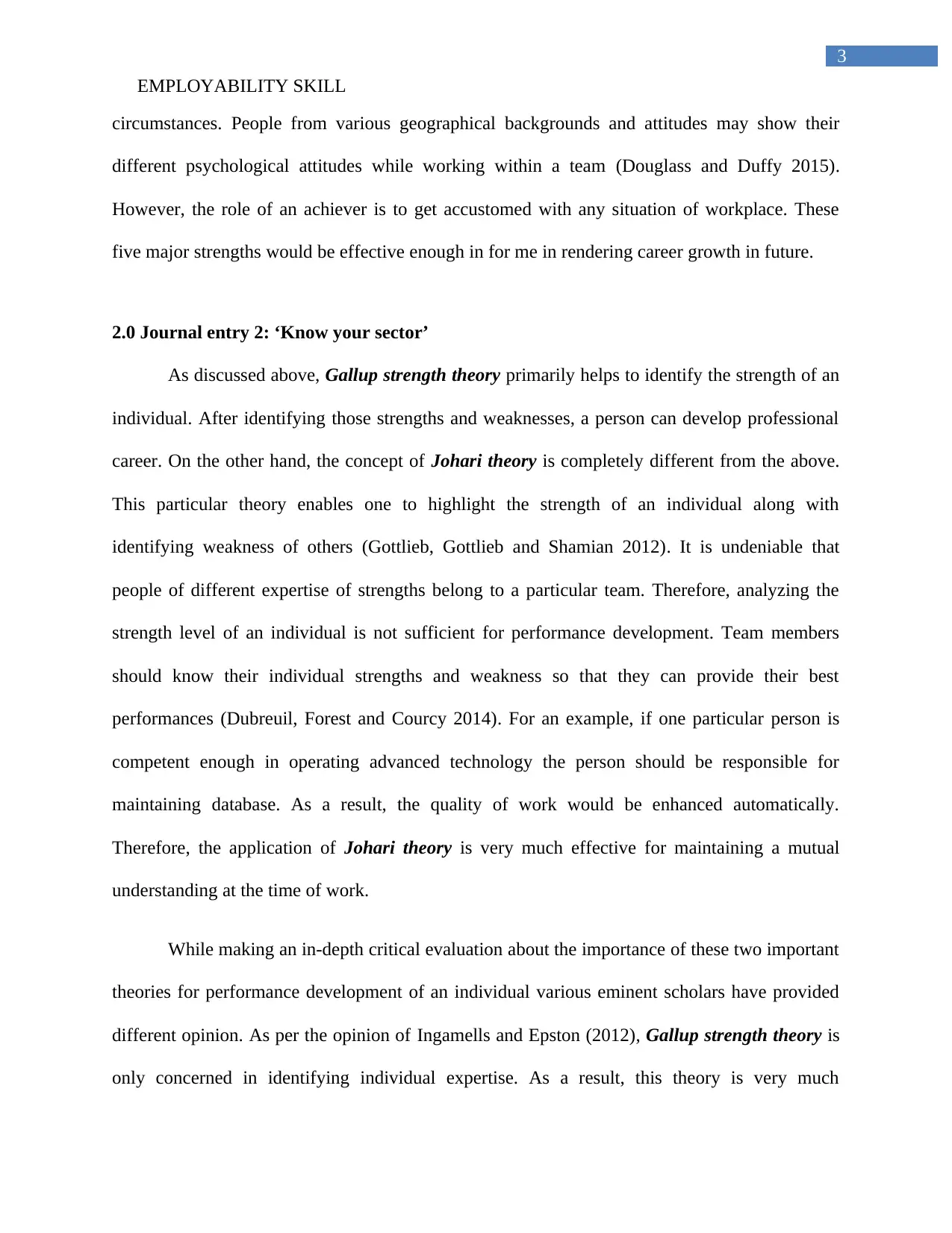
3
EMPLOYABILITY SKILL
circumstances. People from various geographical backgrounds and attitudes may show their
different psychological attitudes while working within a team (Douglass and Duffy 2015).
However, the role of an achiever is to get accustomed with any situation of workplace. These
five major strengths would be effective enough in for me in rendering career growth in future.
2.0 Journal entry 2: ‘Know your sector’
As discussed above, Gallup strength theory primarily helps to identify the strength of an
individual. After identifying those strengths and weaknesses, a person can develop professional
career. On the other hand, the concept of Johari theory is completely different from the above.
This particular theory enables one to highlight the strength of an individual along with
identifying weakness of others (Gottlieb, Gottlieb and Shamian 2012). It is undeniable that
people of different expertise of strengths belong to a particular team. Therefore, analyzing the
strength level of an individual is not sufficient for performance development. Team members
should know their individual strengths and weakness so that they can provide their best
performances (Dubreuil, Forest and Courcy 2014). For an example, if one particular person is
competent enough in operating advanced technology the person should be responsible for
maintaining database. As a result, the quality of work would be enhanced automatically.
Therefore, the application of Johari theory is very much effective for maintaining a mutual
understanding at the time of work.
While making an in-depth critical evaluation about the importance of these two important
theories for performance development of an individual various eminent scholars have provided
different opinion. As per the opinion of Ingamells and Epston (2012), Gallup strength theory is
only concerned in identifying individual expertise. As a result, this theory is very much
EMPLOYABILITY SKILL
circumstances. People from various geographical backgrounds and attitudes may show their
different psychological attitudes while working within a team (Douglass and Duffy 2015).
However, the role of an achiever is to get accustomed with any situation of workplace. These
five major strengths would be effective enough in for me in rendering career growth in future.
2.0 Journal entry 2: ‘Know your sector’
As discussed above, Gallup strength theory primarily helps to identify the strength of an
individual. After identifying those strengths and weaknesses, a person can develop professional
career. On the other hand, the concept of Johari theory is completely different from the above.
This particular theory enables one to highlight the strength of an individual along with
identifying weakness of others (Gottlieb, Gottlieb and Shamian 2012). It is undeniable that
people of different expertise of strengths belong to a particular team. Therefore, analyzing the
strength level of an individual is not sufficient for performance development. Team members
should know their individual strengths and weakness so that they can provide their best
performances (Dubreuil, Forest and Courcy 2014). For an example, if one particular person is
competent enough in operating advanced technology the person should be responsible for
maintaining database. As a result, the quality of work would be enhanced automatically.
Therefore, the application of Johari theory is very much effective for maintaining a mutual
understanding at the time of work.
While making an in-depth critical evaluation about the importance of these two important
theories for performance development of an individual various eminent scholars have provided
different opinion. As per the opinion of Ingamells and Epston (2012), Gallup strength theory is
only concerned in identifying individual expertise. As a result, this theory is very much
Paraphrase This Document
Need a fresh take? Get an instant paraphrase of this document with our AI Paraphraser
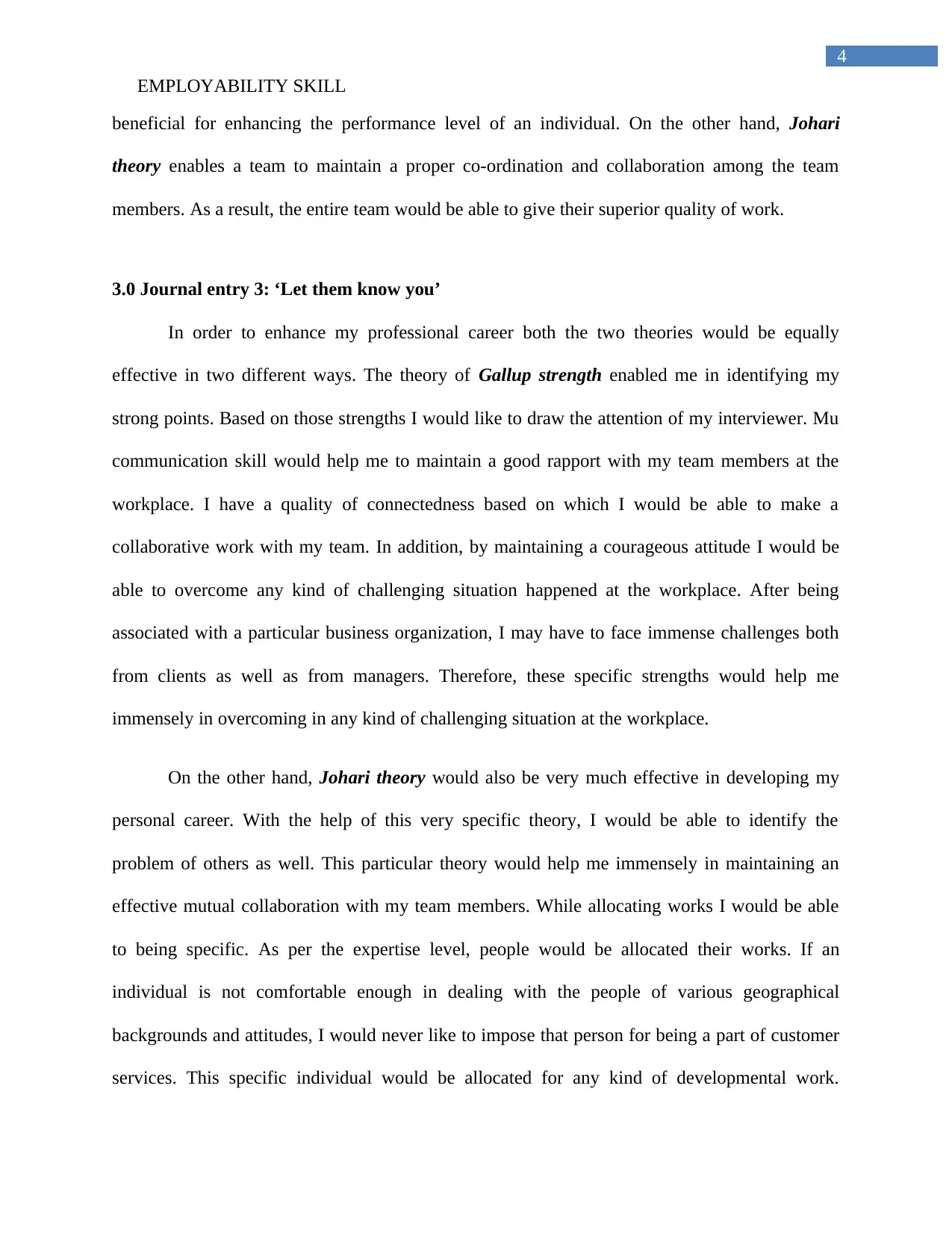
4
EMPLOYABILITY SKILL
beneficial for enhancing the performance level of an individual. On the other hand, Johari
theory enables a team to maintain a proper co-ordination and collaboration among the team
members. As a result, the entire team would be able to give their superior quality of work.
3.0 Journal entry 3: ‘Let them know you’
In order to enhance my professional career both the two theories would be equally
effective in two different ways. The theory of Gallup strength enabled me in identifying my
strong points. Based on those strengths I would like to draw the attention of my interviewer. Mu
communication skill would help me to maintain a good rapport with my team members at the
workplace. I have a quality of connectedness based on which I would be able to make a
collaborative work with my team. In addition, by maintaining a courageous attitude I would be
able to overcome any kind of challenging situation happened at the workplace. After being
associated with a particular business organization, I may have to face immense challenges both
from clients as well as from managers. Therefore, these specific strengths would help me
immensely in overcoming in any kind of challenging situation at the workplace.
On the other hand, Johari theory would also be very much effective in developing my
personal career. With the help of this very specific theory, I would be able to identify the
problem of others as well. This particular theory would help me immensely in maintaining an
effective mutual collaboration with my team members. While allocating works I would be able
to being specific. As per the expertise level, people would be allocated their works. If an
individual is not comfortable enough in dealing with the people of various geographical
backgrounds and attitudes, I would never like to impose that person for being a part of customer
services. This specific individual would be allocated for any kind of developmental work.
EMPLOYABILITY SKILL
beneficial for enhancing the performance level of an individual. On the other hand, Johari
theory enables a team to maintain a proper co-ordination and collaboration among the team
members. As a result, the entire team would be able to give their superior quality of work.
3.0 Journal entry 3: ‘Let them know you’
In order to enhance my professional career both the two theories would be equally
effective in two different ways. The theory of Gallup strength enabled me in identifying my
strong points. Based on those strengths I would like to draw the attention of my interviewer. Mu
communication skill would help me to maintain a good rapport with my team members at the
workplace. I have a quality of connectedness based on which I would be able to make a
collaborative work with my team. In addition, by maintaining a courageous attitude I would be
able to overcome any kind of challenging situation happened at the workplace. After being
associated with a particular business organization, I may have to face immense challenges both
from clients as well as from managers. Therefore, these specific strengths would help me
immensely in overcoming in any kind of challenging situation at the workplace.
On the other hand, Johari theory would also be very much effective in developing my
personal career. With the help of this very specific theory, I would be able to identify the
problem of others as well. This particular theory would help me immensely in maintaining an
effective mutual collaboration with my team members. While allocating works I would be able
to being specific. As per the expertise level, people would be allocated their works. If an
individual is not comfortable enough in dealing with the people of various geographical
backgrounds and attitudes, I would never like to impose that person for being a part of customer
services. This specific individual would be allocated for any kind of developmental work.
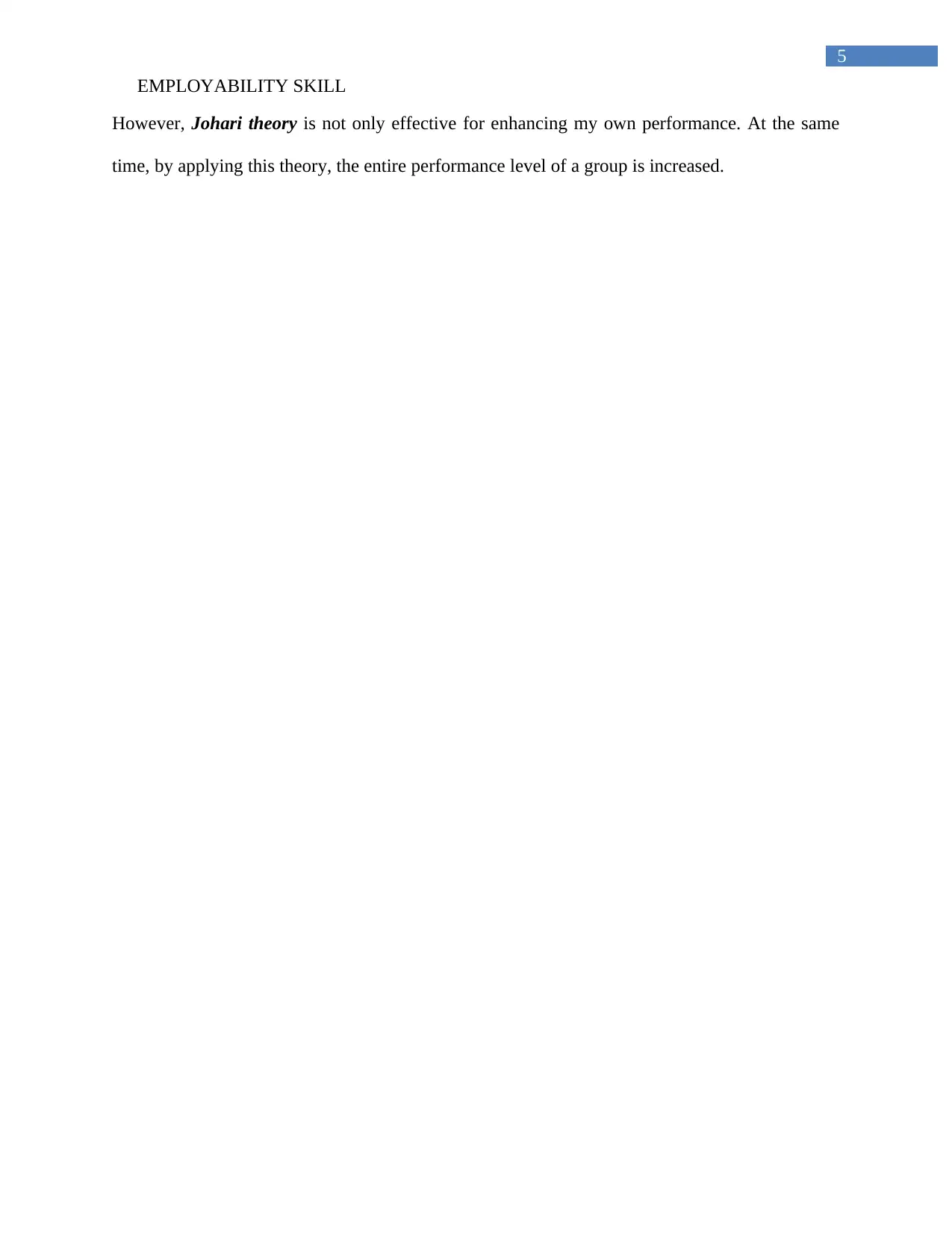
5
EMPLOYABILITY SKILL
However, Johari theory is not only effective for enhancing my own performance. At the same
time, by applying this theory, the entire performance level of a group is increased.
EMPLOYABILITY SKILL
However, Johari theory is not only effective for enhancing my own performance. At the same
time, by applying this theory, the entire performance level of a group is increased.
⊘ This is a preview!⊘
Do you want full access?
Subscribe today to unlock all pages.

Trusted by 1+ million students worldwide

6
EMPLOYABILITY SKILL
Reference List:
Asplund, J. and Blacksmith, N., 2012. Productivity through strengths. In The Oxford handbook
of positive organizational scholarship.
Dochy, F., Gijbels, D., Segers, M. and Van den Bossche, P., 2012. Theories of learning for the
workplace: Building blocks for training and professional development programs. Routledge.
Douglass, R.P. and Duffy, R.D., 2015. Strengths use and life satisfaction: a moderated mediation
approach. Journal of Happiness Studies, 16(3), pp.619-632.
Dubreuil, P., Forest, J. and Courcy, F., 2014. From strengths use to work performance: The role
of harmonious passion, subjective vitality, and concentration. The Journal of Positive
Psychology, 9(4), pp.335-349.
Gottlieb, L.N., Gottlieb, B. and Shamian, J., 2012. Principles of strengths-based nursing
leadership for strengths-based nursing care: A new paradigm for nursing and healthcare for the
21st century. Nursing Leadership, 25(2), pp.38-50.
Ingamells, K. and Epston, D., 2012. Placing strengths into storylines-building bridges between
strengths-based and narrative approaches. International Journal of Narrative Therapy &
Community Work, (3), p.50.
Linley, P.A., Biswas-Diener, R. and Trenier, E., 2012. Positive psychology and strengths
coaching through transition. Developmental Coaching: Life transitions and generational
perspectives, Routledge, Hove LIZ H A LL.
EMPLOYABILITY SKILL
Reference List:
Asplund, J. and Blacksmith, N., 2012. Productivity through strengths. In The Oxford handbook
of positive organizational scholarship.
Dochy, F., Gijbels, D., Segers, M. and Van den Bossche, P., 2012. Theories of learning for the
workplace: Building blocks for training and professional development programs. Routledge.
Douglass, R.P. and Duffy, R.D., 2015. Strengths use and life satisfaction: a moderated mediation
approach. Journal of Happiness Studies, 16(3), pp.619-632.
Dubreuil, P., Forest, J. and Courcy, F., 2014. From strengths use to work performance: The role
of harmonious passion, subjective vitality, and concentration. The Journal of Positive
Psychology, 9(4), pp.335-349.
Gottlieb, L.N., Gottlieb, B. and Shamian, J., 2012. Principles of strengths-based nursing
leadership for strengths-based nursing care: A new paradigm for nursing and healthcare for the
21st century. Nursing Leadership, 25(2), pp.38-50.
Ingamells, K. and Epston, D., 2012. Placing strengths into storylines-building bridges between
strengths-based and narrative approaches. International Journal of Narrative Therapy &
Community Work, (3), p.50.
Linley, P.A., Biswas-Diener, R. and Trenier, E., 2012. Positive psychology and strengths
coaching through transition. Developmental Coaching: Life transitions and generational
perspectives, Routledge, Hove LIZ H A LL.
Paraphrase This Document
Need a fresh take? Get an instant paraphrase of this document with our AI Paraphraser
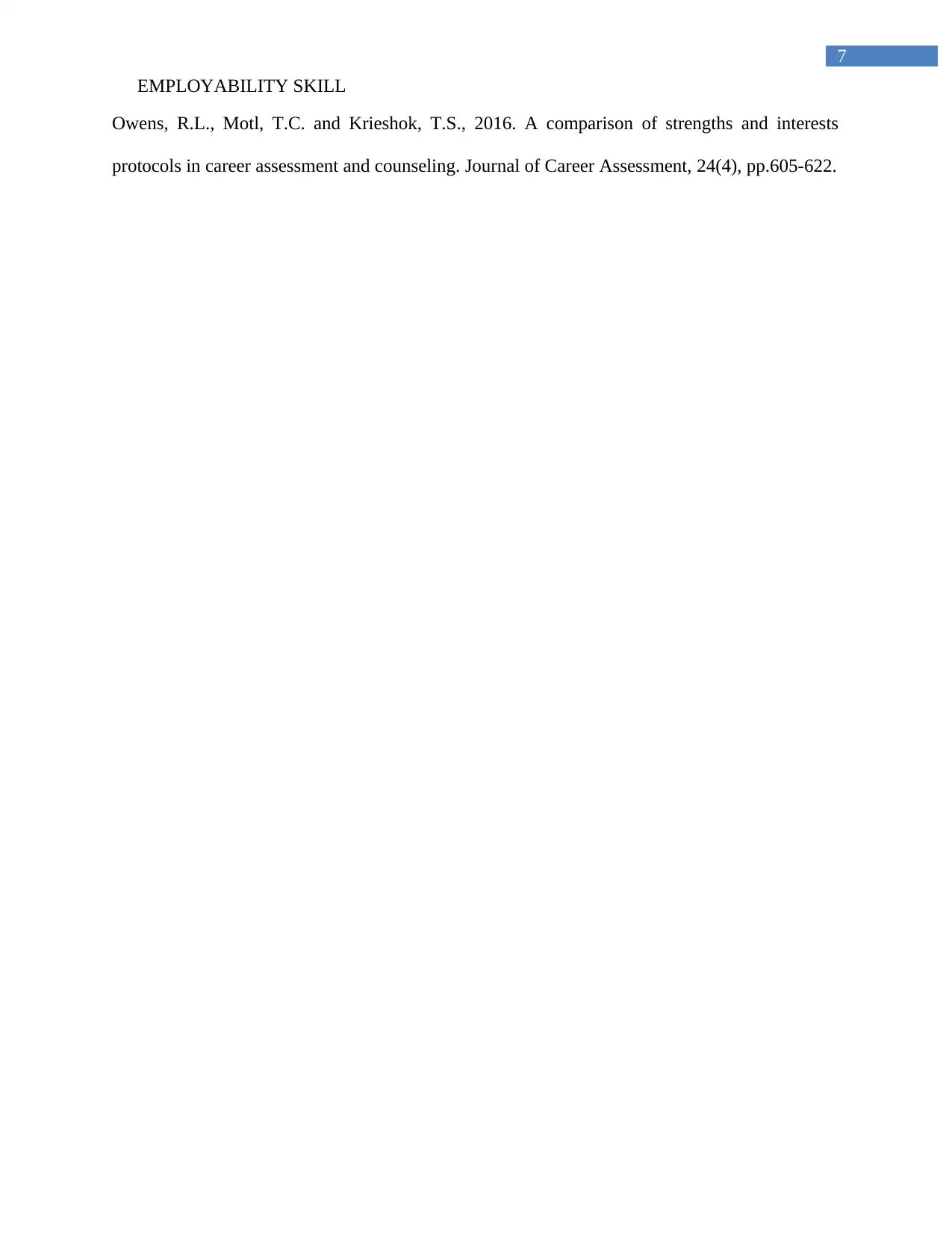
7
EMPLOYABILITY SKILL
Owens, R.L., Motl, T.C. and Krieshok, T.S., 2016. A comparison of strengths and interests
protocols in career assessment and counseling. Journal of Career Assessment, 24(4), pp.605-622.
EMPLOYABILITY SKILL
Owens, R.L., Motl, T.C. and Krieshok, T.S., 2016. A comparison of strengths and interests
protocols in career assessment and counseling. Journal of Career Assessment, 24(4), pp.605-622.
1 out of 8
Related Documents
Your All-in-One AI-Powered Toolkit for Academic Success.
+13062052269
info@desklib.com
Available 24*7 on WhatsApp / Email
![[object Object]](/_next/static/media/star-bottom.7253800d.svg)
Unlock your academic potential
Copyright © 2020–2026 A2Z Services. All Rights Reserved. Developed and managed by ZUCOL.





